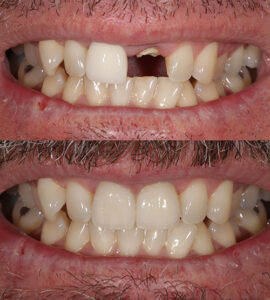Missing teeth have a large impact on the health, function, and appearance of your teeth. A missing tooth can be a source of self-consciousness, but it can also lead to issues such as infection or even bone loss in the jaw. In addition, a missing tooth can cause discomfort or other problems when you bite, chew, and talk. Dental implants are an effective, permanent, and surprisingly simple solution for patients who have missing teeth. Our extensively trained dentist, Dr. Diana Tadros, provides tooth implants for her dental patients in Fort Lauderdale, FL.
 What Is a Dental Implant?
What Is a Dental Implant?
A dental implant is essentially an artificial tooth root that acts as a base for an artificial tooth. The implant is placed within the jawbone where it can bond with the natural bone, making it a healthy and solid foundation for crowns or dental bridges.
Do I Need a Dental Implant?
If you have a missing tooth or a tooth that requires extraction due to damage or infection, you may be a good candidate for a dental implant. Replacing a missing tooth or teeth is important to preserve proper function of the teeth, preventing issues such as bone loss. They make a good alternative to dentures for many patients facing tooth loss or missing teeth.
What Are the Benefits of Dental Implants?
Dental implants have several advantages. They tend to last longer than traditional dentures or dental bridges. Dentures usually last about 7-15 years while implants can last for over 20 years on average. Dental implants also preserve bone, compared to dentures or unaddressed missing teeth which can result in bone resorption. Finally, dental implants are not susceptible to tooth decay, unlike options like supporting a dental bridge with the natural teeth.
WHAT TYPES OF DENTAL IMPLANTS ARE AVAILABLE?
Generally, there are three main types of dental implant restorations that may be used, depending on the unique needs of each patient:
Single-Tooth Dental Implants
For patients that need to replace a single tooth or several individual teeth in various places of the upper and/or lower arch, a single-tooth dental implant provides a strong, long-lasting option. This includes a dental implant post with an attached crown at the site(s) of the missing tooth or teeth.
Multi-Tooth Dental Implants
When there are two or more missing teeth next to each other, a dental bridge anchored to one or more dental implants can provide a durable, stable solution and natural-looking outcome without having to secure a post and corresponding crown for each missing tooth.
Implant Dentures
To restore an entire row that has multiple missing, damaged, or decaying teeth—or to switch from traditional removable dentures—a full arch replacement may be the best solution. This effective method uses four to eight dental implants on the upper or lower arch, or both arches, to attach a customized implant-supported denture.
During a consultation, Dr. Tadros will examine the number of missing teeth, location of the gap(s), and amount of existing jawbone density to determine which replacement option will provide the best result.
Dental Implants vs. Removable Dentures
Dental implants generally provide a superior, long-lasting solution for missing teeth compared to traditional dentures. Surgically placed into the jawbone, implants act like natural tooth roots, preserving bone density and facial structure. This stability offers a secure, comfortable fit that feels and functions like real teeth, allowing patients to enjoy a full range of foods without worry. Implants don’t slip or require adhesives, unlike dentures, which rest on the gums and may become loose over time. While dentures are often less expensive initially, they can lead to bone loss, facial changes, and repeated adjustments. In contrast, implants are designed for durability and deliver a significant boost in confidence and quality of life, making them an ideal choice for those seeking a permanent, high-functioning tooth replacement.
What Does the Dental Implant Procedure Involve?
To place a tooth implant, Dr. Tadros will first use either local anesthesia or IV sedation to keep you comfortable throughout the procedure. Then, an incision is made in the gums where you are missing a tooth. The implant body can then be placed into the bone. Over the next 3-4 months, this implant body will integrate with your bone.
About 3-4 months after your dental implant body is placed, Dr. Tadros will then attach an abutment on the implant body, followed by a custom crown or dental bridge. This crown or bridge is custom made to fit well in the gap and match the surrounding teeth in size, shape, and color.
Most patients are surprised at how quick and painless the tooth implant procedure is. Each appointment can be completed in no more than an hour, and most patients can return to work or their normal routine the day after each appointment. There is a very short recovery period after your initial appointment to allow your gums to heal, but any discomfort is easily managed with over-the-counter medication.
HOW LONG DO DENTAL IMPLANTS LAST?
Once completely fused to the jawbone, a dental implant post is considered to be a permanent part of the mouth that is intended to last a lifetime. The attached prosthetic restoration (crown, bridge, or denture) can also be long-lasting, with an average lifespan of 10 to 15 years with appropriate care and cleaning.
For the best results, patients should avoid excessively hard or chewy foods, biting ice, and using their teeth as tools, as this type of pressure may be damaging to the restoration. Additionally, if clenching or grinding teeth at night may be an issue, you may be advised to wear a mouth guard for further protection and to evade premature wear and tear.
HOW DO I CARE FOR MY DENTAL IMPLANTS?
Just as dental implants are intended to look and feel like regular teeth, maintaining them requires very similar care as well. For optimal upkeep, it is recommended to thoroughly brush and floss twice daily, attend regular professional cleanings and exams, and avoid tobacco use—which can hinder recovery and overall well-being of the teeth and gums. Dr. Tadros will provide complete post-procedure instructions so you are well-educated on the aftercare for dental implants and can properly support the health and appearance of your new restorations.
Schedule a Dental Implant Appointment
If you are missing a tooth or multiple teeth, schedule an appointment with Dr. Tadros at Beauty and the Teeth Dental. Call our Fort Lauderdale office at (954) 519-7465 or contact us online to get started.
Frequently Asked Questions
-
How long before dental implants settle?
It can take an average of six to eight months before dental implants fully heal, or “settle.”
-
What can you not do after dental implants?
After you receive dental implants, you should avoid foods that are hard, crunchy, sticky, chewy, acidic, or spicy. You should also avoid tobacco, alcohol, or caffeine, as these can slow the healing process. Finally, it is best to use a soft manual toothbrush, rather than an electric toothbrush, and a saltwater rinse or prescription mouthwash in favor of your regular mouthwash.
-
How long is recovery after a tooth implant?
Downtime after a tooth implant is very short. Many patients can return to their normal routines, including work, the next day. However, complete healing can take up to 4-6 months to complete.
-
What is the most painful part of a tooth implant?
Anesthesia is used during a tooth implant procedure, so it should not be painful at all. You may feel pressure or some discomfort during the drilling process. Dr. Tadros will explain expectations before your procedure begins.
-
How long after implant can you get crown?
Typically, crowns can be placed about three to six months after an implant. This allows the implant to heal before placing the crown.
-
Can you eat normally with dental implants?
As you heal from having your dental implants placed, you should eat soft foods. When the implant is fully healed, you can eat normally.
-
Can I brush my teeth after getting a dental implant?
While your dental implant is still healing, you should carefully brush your teeth using a soft-bristled manual toothbrush. Once the implant is healed, you can brush as you normally would.
-
Will I need time off work after dental implant?
Most patients are ready to return to work the day after their dental implant procedure.
-
Can I drink coffee after a dental implant?
It may be recommended to avoid drinking coffee after a dental implant, as caffeine can slow the healing process.
-
How can I make my dental implant heal faster?
Some steps you can take to support healing include prioritizing rest, staying hydrated, rinsing with salt water, and gently applying ice packs. Dr. Tadros will give you specific directions for your healing period after receiving a dental implant.
-
Are dental implants safe for seniors?
Yes. Many individuals over the age of 50 have missing teeth, and dental implant treatments can correct this problem. Implants are often a good choice over conventional dentures for elderly patients because dentures can be uncomfortable and may even cause problems with the gums and jaw bone.
-
Can a dental implant be done in one day?
In many cases, same-day dental implants can be performed in a single procedure. This may take anywhere from 30 minutes to 3 hours to complete, depending on the number of implants needed.
-
Can a tooth implant get infected?
Dental implants can become infected just like regular teeth. To avoid this, be sure that you are staying hydrated by drinking enough water, lowering your sugar intake, visiting the dentist for your regular checkups, and taking care of your teeth on a daily basis.
-
Can all teeth be replaced with implants?
Yes. Today dental implants can be used to replace a single tooth or a full mouth of teeth.
-
Can you get full mouth dental implants?
Yes, dental implants can be used to replace a full mouth of teeth.
-
Can your mouth reject an implant?
It is extremely rare that your body will reject a dental implant.
-
Can I drive home after dental implant surgery?
If you are put under IV sedation for your dental implant surgery, you will need a family member or friend to drive you home.
-
Can I get a dental implant years after extraction?
If you have good oral health, then a dental implant may still be an option. However, if you are missing pieces of your jaw following a tooth extraction, you may first have to undergo a bone grafting procedure.
-
Can you get a temporary tooth while waiting for an implant?
Yes. A temporary bridge which is usually made of acrylic can be placed as a temporary tooth.
-
Do tooth implants feel real?
Because dental implants are not natural teeth, they do not have roots or nerves. This means that you will not feel those sensations that you would with a natural tooth.











